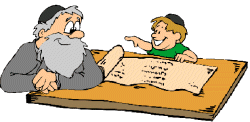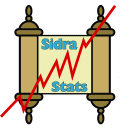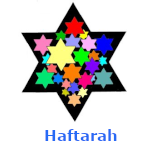Tzav
צַו
Leviticus 1:1 – 5:26
Ashes of the Burnt Offering
HaShem spoke to Moses, telling him to give the following instructions to Aaron and his descendants:
This is the law of the burnt offering. The burnt offering shall remain on the altar’s hearth all night until morning so that the altar’s fires can be ignited with it.
The priest shall then put on his linen vestments, including his linen pants. He shall remove the ashes of the burnt offerings consumed by the fire that are on the altar, and place them near the altar. He shall then take off his vestments, and put on other garments. He shall then take the ashes to a ritually clean place outside the camp.
The fire of the altar shall be ignited with the remains of the offerings. Each morning, the priest shall kindle wood on them. On this wood, he shall then arrange burnt offerings and burn the choice parts of the peace offerings. Thus, there shall be a constant fire kept burning on the altar, without being extinguished.
Laws of the Meal Offering
This is the law of meal offering: One of Aaron’s descendants shall offer it before Me, near the place where one ascends to the altar.
With his three middle fingers, he shall lift up some of the wheat meal and oil of the offering, and then remove all the frankincense on the offering. He shall burn this on the altar as an appeasing fragrance – it is the memorial portion to HaShem. Aaron and his descendants shall then eat the rest of the offering. It must be eaten as unleavened bread in a holy place. They must therefore eat it in the enclosure of the Communion Tent. It shall not be baked as leavened bread. I have given this to them as their portion of My fire offerings, and it is holy of holies, like the sin offering and the guilt offering.
Every male among Aaron’s descendants may eat it. It is an eternal law for all generations that it be taken from HaShem’s fire offerings. Any [food] coming in contact with it shall become holy.
The High Priest’s Offering
HaShem spoke to Moses, saying: This is the offering that Aaron and his descendants must bring from the day that any one of them is anointed as High Priest. It shall consist of 1/10 ephah of wheat meal, and it shall be a daily meal offering, with one-half offered in the morning, and one-half in the evening. It shall be prepared with olive oil on a flat pan after being boiled and baked. It is then to be presented as an offering of many wafers of bread, an appeasing fragrance to HaShem. It is a law for all time that the anointed priest among Aaron’s descendants shall prepare it. It must be completely burned. Likewise, every meal offering brought by a priest must be completely burned and not eaten.
Laws of Sin Offerings
HaShem spoke to Moses, telling him to give the following message to Aaron and his descendants: This is the law of the sin offering: The sin offering must be slaughtered before HaShem in the same place that the burnt offering is slaughtered. It is holy of holies.
Any priest fit to offer it may eat it. It must be eaten in a holy place, in the enclosure around the Communion Tent. Any food touching the sin offering shall become sanctified. If its blood splashes on any garment, it must be washed off in a sanctified area. Any clay pot in which it is cooked must be broken. However, if it is cooked in a copper pot, the pot may be purged and rinsed with water. Although it is holy of holies, any male priest may eat it. However, any sin offering whose blood is brought into the Communion Tent to make atonement in the sanctuary may not be eaten. It must be burned in a fire.
Laws of Guilt Offerings
This is the law of the guilt offering, which is holy of holies. The guilt offering must be slaughtered in the same place that the burnt offering is slaughtered, and its blood must be dashed on all sides of the altar. All the choice parts, such as the broad tail and the fat covering the stomachs, must be presented. The two kidneys and the fat on them along the flanks, and the lobe over the liver near the kidneys, must also be removed. The priest must burn all these as a guilt offering on the altar, a fire offering to HaShem. All the male priests may eat the rest. It shall be eaten in a sanctified area, since it is holy of holies. The sin offering and the guilt offering have exactly the same laws insofar as they can be given to any priest fit to offer them. Similarly, any priest fit to sacrifice a person’s burnt offering can share in the skin of the burnt offering after it is sacrificed.
The unburnt portion of any meal offering which is baked in an oven, pan-fried, or deep-fried shall also be given to any priest fit to offer it. Likewise, any meal offering, whether mixed with oil or dry, shall belong equally to all of Aaron’s descendants.
Laws of Peace Offerings
This is the law of the peace offering that is sacrificed to HaShem. If it is offered as a thanksgiving offering, then it must be presented along with unleavened loaves mixed with oil, flat matzahs saturated with oil, and loaves made of boiled flour mixed with oil. The sacrifice shall also be presented along with loaves of leavened bread. All these shall be presented with one’s thanksgiving peace offering. He shall present some of each of the four bread offerings as an elevated gift to HaShem. This shall belong to the priest who sprinkles the blood of the peace offering. The flesh of the thanksgiving peace offering must be eaten on the day it is offered. None of it may be left over until morning. However, if one’s sacrifice offering is meant merely to fulfill a general vow or a specific pledge, he shall eat it on the same day that he offers his sacrifice, but what is left over may also be eaten on the next day. Nevertheless, what is left over from the sacrifice’s flesh on the third day, must be burned in fire.
If the person bringing the offering even plans to eat it on the third day, the sacrifice will not be accepted. It is considered putrid, and it will not be counted in his favor. Any person who eats it will bear his guilt. Any sacrificial flesh that comes in contact with something unclean may not be eaten; it must be burned in fire. Otherwise, any ritually clean person may eat the flesh. But if any person eats the flesh of a peace sacrifice to HaShem while still in a state of ritual uncleanliness, his soul will be cut off from his people. Any person who comes in contact with human uncleanness, or with an unclean mammal or other unclean creature, and then eats the flesh of a peace offering to HaShem, shall have his soul cut off from his people.
HaShem spoke to Moses, telling him to relate the following to the Israelites: Do not eat any of the hard fat in an ox, sheep, or goat. Even if an animal is improperly slaughtered or fatally wounded, you may use its hard fat for any purpose you desire, as long as you do not eat it. But anyone who eats the hard fat offered to HaShem in any animal shall have his soul cut off from his people. Do not eat any blood, whether from a mammal or a bird, no matter where you may live. Any person who eats blood shall have his soul cut off from his people.
The Priests’ Portion
HaShem spoke to Moses, telling him to speak the following to the Israelites: When anyone brings a peace sacrifice to HaShem, he must bring a special offering to HaShem from it. With his own hands, he must bring the choice parts presented as a fire offering to HaShem on top of the animal’s chest. He shall wave the chest in the prescribed motions as a wave offering before HaShem.
The priest shall then burn the choice parts on the altar. The chest, on the other hand, shall belong to Aaron and his descendants. The right hind leg of your peace offerings shall also be given as an elevated gift to the priest. Any descendant of Aaron fit to offer the blood and fat of the peace offerings shall have the right leg as a portion. This is because I have taken the chest as a wave offering and the hind leg as an elevated gift from the Israelites, from their peace sacrifices, and I have given these parts to Aaron the priest, and his descendants. It is a law for all times that this be taken from the Israelites.
This is the portion of HaShem’s fire offerings that was given when Aaron and his sons were anointed, on the day that He brought them forth to be priests to HaShem. On the day that He anointed them, HaShem commanded that this be given to them by the Israelites. It is an eternal law for all generations. This then is the law of the burnt offering, the meal offering, the sin offering, the inauguration offering, and the peace offering, which HaShem gave to Moses on Mount Sinai. It was given on the day that He commanded the Israelites to offer their sacrifices to HaShem in the Sinai Desert.
Installation of the Priests
HaShem spoke to Moses, saying: “Take Aaron along with his sons, the vestments, the anointing oil, the sin offering bull, the two rams, and the basket of unleavened bread. Gather the entire community at the entrance of the Communion Tent.” Moses did as HaShem commanded and the community was assembled at the Communion Tent’s entrance. Moses said to the community, “This is what HaShem has commanded to be done.”
Moses brought forth Aaron and his sons and immersed them in a mikvah. He then dressed Aaron with the tunic, belted him with the sash, put the robe on him, and placed the ephod over it. He girded him with the ephod’s belt and tightened it on him. He then placed the breastplate on the ephod and placed the Urim and Thumim in the breastplate. He placed the turban on Aaron’s head, and toward his face just below the turban, he placed the gold forehead plate as a sacred coronet. It was all done as HaShem commanded Moses.
Moses took the anointing oil and anointed the Tabernacle and everything in it, thus sanctifying them. He sprinkled some of the oil] on the altar seven times. He then anointed the altar and all its utensils, as well as the washstand and its base, thus sanctifying them. He poured some of the anointing oil on Aaron’s head, and he anointed him to sanctify him. Moses then brought forth Aaron’s sons, and he dressed them in tunics, girded them with sashes, and fitted them with hats. It was all done as HaShem had commanded Moses.
He brought forth the bull for the sin offering, and Aaron and his sons pressed their hands on its head. Moses slaughtered it and collected the blood. With his finger, he placed the blood all around the altar’s protrusions, thus purifying the altar. He poured the rest of the blood at the altar’s base, thus sanctifying it so that atonement could be offered on it. He took the fat on the stomachs, the lobe of the liver, and the two kidneys along with their fat, and Moses burned them on the altar. All the rest of the bull – its skin, flesh, and insides – he burned in fire outside the camp. It was all done as HaShem had commanded Moses.
He brought forth the ram for the burnt offering, and Aaron and his sons pressed their hands on its head. He slaughtered it, and Moses dashed its blood on all sides of the altar. He cut the ram into pieces, and Moses burned the head, the cut pieces, and the intestinal membrane on the altar, having previously scrubbed the intestines and legs with water. Moses thus burned the entire ram on the altar as a burnt offering. It was an appeasing fragrance, a fire offering to HaShem, and it was all done as HaShem had commanded Moses.
He brought forth the second ram, which was the installation ram, and Aaron and his sons pressed their hands on the ram’s head. He slaughtered it, and Moses took some of its blood and placed it on Aaron’s right ear lobe, on his right thumb, and on his right big toe.
Moses brought forth Aaron’s sons, and he placed some of the blood on their right ear lobes, their right thumbs, and their right big toes. Moses sprinkled the rest of the blood on all sides of the altar. He took the choice portions: The broad tail, all the fat on the stomachs, the lobe of the liver, the two kidneys along with their fat, and the right hind leg. From the basket of unleavened bread, before HaShem, he took one loaf of unleavened bread, one loaf of oil bread, and one flat loaf, and he placed them on the choice portions and the right hind leg. Moses placed all this in Aaron’s hands and in his sons’ hands, and he waved them in the prescribed motions as a wave offering before HaShem. Moses took it from their hands, and he burned it on the altar together with the burnt offering. This was the installation offering, an appeasing fragrance, a fire offering to HaShem. Moses took the ram’s chest and made the prescribed motions for a wave offering before HaShem. This was Moses’ own portion of the installation ram. It was all done as HaShem had commanded Moses.
Moses took some of the anointing oil, together with some of the blood from the altar, and he sprinkled it on Aaron and his vestments, as well as on Aaron’s sons and their vestments. He thus sanctified Aaron and his vestments as well as Aaron’s sons and their vestments.
Moses said to Aaron and his sons, “Cook the flesh at the Communion Tent’s entrance. There you shall eat it, along with the bread in the installation basket. Do it, because I have given instructions that Aaron and his sons eat these things. Whatever is left over of the flesh and bread, you must burn in fire. Do not leave the entrance of the Communion Tent for seven days, until your period of inauguration is complete. This is because your installation ceremony shall last for seven days. HaShem has commanded that whatever was done on this day must be done all seven days to atone for you. Remain at the Communion Tent’s entrance day and night for seven days. You will thus keep HaShem’s charge and not die since this is what was commanded.” Aaron and his sons did all these things, just as HaShem had commanded through Moses.
Haftarah Connection

Jeremiah 7.21-8.3, 9.22-23
This week’s Parsha continues with different sacrifices that were made in the Mishkan.
In the Haftara, the Prophet Jeremiah lists the sins of the people of Israel. One of the sins he mentions is that of building altars to foreign gods. The prophet says that they should do just and kind deeds instead of bringing sacrifices.
Sidra Stats

- Twenty-Fifth of 54 Sedras in the Torah
- Written on 170 lines in the Sefer Torah
- 97 P’sukim (verses)
- 1,353 words
- 5,096 letters
Next week’s Parashat: Shemini


